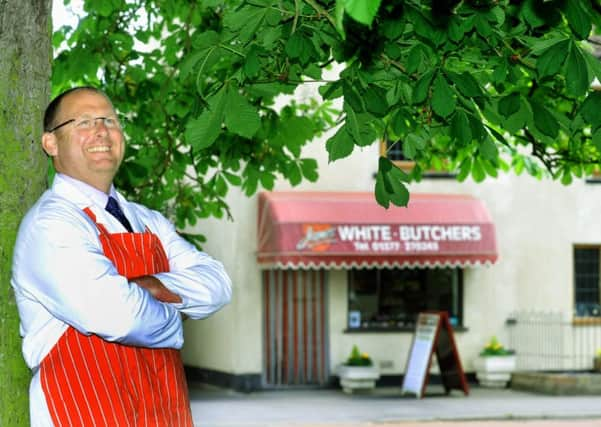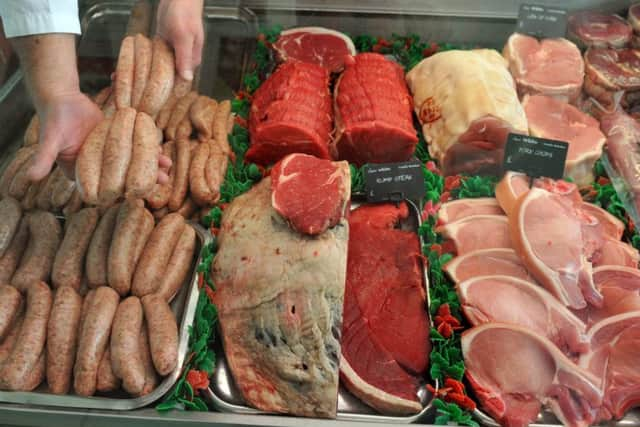Simple ethos keeps village butcher thriving


Hutton Cranswick enjoyed a gorgeous sunny start to Tuesday morning and in this corner of East Yorkshire, situated next to the village green, James White’s butcher’s shop was busy with a stream of customers coming and going to buy everything from two pieces of chicken for their lunch to a leg of lamb and half a dozen ribeye steaks.
There’s nothing hanging outside the shop window and inside there’s not a pie in sight. This is perhaps the ultimate antithesis to how we are informed that small businesses must change and gather more strings to their bow in order to survive.
Advertisement
Hide AdAdvertisement
Hide Ad“We’re all about meat,” says James, who took over the running of the business from his father Tony in 2001.


“We don’t sell anything else apart from meat and it’s all about guaranteeing the best I can possibly provide to my customers from as local a mileage as I can muster. What I’m interested in is how the animals have been looked after and what they have been fed on. Stress-free lives lead to tender meat and good diets lead to tasty meat.
“I’ve always liked the idea of low mileage for animals to travel and knowing where they have come from means you are in control of what you put into your shop. I get all my beef from Raven Hill Farm in Kilham; my pigs from Ian Broumpton in Brandesburton and John Hepworth near Hornsea; and lambs currently from as close as Norman Weir just up the road in the village. He could almost walk them here. We’re a small family butchers and care about what we do and who we buy from. I try to use small farms where I can too. It all helps.”
James grew up in Belper, Derbyshire. His dad had a butcher’s shop in the little village of Ambergate. The move east came about because of James’ interest in following Tony into the family business and the shop at Hutton Cranswick also had an abattoir.
Advertisement
Hide AdAdvertisement
Hide Ad“A lot has changed in butchering since I was helping dad as a lad 30 years ago. I learned how to make sausages and burgers and was boning sides of bacon out from being a boy. I also liked the people side, serving customers and talking with them. I remember being on a stool writing down the amounts to be charged on paper and adding them up.


“When I first started most meat was still sold on the bone. Today it’s nearly all boneless. Many customers now go for lean meat because we are told lean is better for us, but then marbling adds to the taste. It’s a fine margin and every customer I have shops differently. I have lean beef and beef with fat side by side in the window because one person wants it that way and the next wants it the other.
“We’re still a traditional butcher’s shop bothered more about selling just good quality meat than lots of stuff with loads of marinade, although we do sell that too. We have the newer spices, lemon chicken, Caribbean pork, Mexican and Thai sauces. There was a time when we just sold beef burgers, now we sell eight different varieties. I remember when tomato sausages were seen as quite risqué.”
Tuesday morning this week was a prime example of why the small local village butcher can survive in today’s increasingly competitive supermarket environment. Trade was brisk, talk was friendly and even those who went by gave an acknowledging wave.
Advertisement
Hide AdAdvertisement
Hide Ad“People who buy meat in supermarkets are generally price driven and to an extent I think we all are but quality makes a difference. I pride myself on this business being the best it can possibly be. I feel I have a very good product and that is borne out by the number of customers we get not just from the village and surrounding villages but also regular customers from York, Hull, Scarborough and over the Humber Bridge. It all boils down to the quality and care we provide.
“I have a great team of three full-time and three part-timers. Mike Young still slaughters the stock with me each Monday and has just retired from full-time work this year. Bob Mell is my right hand man and shop manager, and Keith Chapman who joined us just last year. They are all experienced and knowledgeable meat tradesmen who know what butchery is all about.
“Dad picks up the sheep to bring here and also goes up to Raven Hill to look over the cattle available. We look for nice, clean heifers at around 500-550 kilos, usually Limousin X, Angus X or British Blue X. We kill two or three beasts a week, six to eight pigs and six to eight lambs for our own use in the shop and supplying hotels and pubs in the Beverley and Driffield area.”
FAMILY HISTORY
Tony’s uncle was a butcher and his father was a farmer. The Whites have been involved with farming and butchering for 150 years. Tony came north with wife Glennis, James and their daughter Sally in 1988. Tony kept sheep on their smallholding behind the butcher’s shop until he retired.
Advertisement
Hide AdAdvertisement
Hide AdJames supplements the butchery income by supplying local farmers who are trading their meat elsewhere with butchery and abattoir services; he also runs a successful, busy hog roast catering business for weddings, parties and all types of special events throughout East Yorkshire.